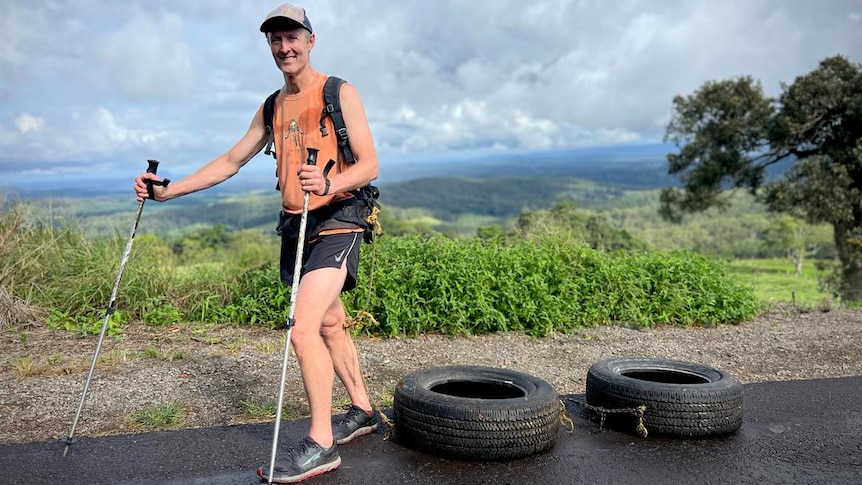Australia Weather News

Adrian McCallum has developed a unique training regime to prepare for the trek. (ABC Sunshine Coast: Jessica Ross)
The rolling green hills of Queensland's Sunshine Coast hinterland are the last place you would expect to find a polar explorer training for an Arctic expedition.
In the lead-up to a one-month trip to Greenland, ice and snow scientist Adrian McCallum has been dragging tyres around the roads of his hometown of Maleny.
The gruelling workout will help prepare the 53-year-old for the rigours of a human-powered expedition across the dangerous terrain of the North Pole.
It will be the sixth expedition to the polar cap for the scientist, who is also head of engineering at the University of the Sunshine Coast (UniSC).
Dr McCallum will lead an eclectic international team, consisting of a civil engineer, a surgeon, a school teacher and a photographer.
Together they will trek more than 560 kilometres to study snow density and mass of the Greenland ice sheet and any changes that could impact sea levels.
"It's actually places like Australia that might be more affected by melting of the Greenland ice caps," Dr McCallum said.
"So it's not obvious, but there's a lot of sense for Australians to be doing work in the Arctic because there are implications for Australia."
Putting in the hard yards
There'll be no snowmobiles or aerial survey planes involved.
The team will carry out their mission on foot and skis, dragging sledges carrying up to 100 kilograms of scientific equipment and food to highlight sustainable expeditions.
Dr McCallum, who was in the Defence Force for 20 years prior to becoming a polar explorer, said the idea for the expedition, which is not his first human-powered Arctic trek, was hatched during the COVID pandemic and has been up to four years in the planning.
He said it was a "very good platform" to demonstrate that the research could be carried out in a "relatively lightweight and relatively cheap manner".
The cost for each explorer is $10,000, with UniSC partially paying for Dr McCallum's share.
Some data will be collected for UniSC, while some will be used by researchers at other universities around the world.
While scientific observations are a key objective of the expedition, they are not the only consideration for the seasoned polar explorer.
"There have been some sleepless nights prior to this expedition," Dr McCallum said.
"Because of my previous Antarctic and Arctic experience, I'm also the most experienced traveller so my job is to ultimately keep everyone alive on the ice."
Dodging deadly threats
It's nearly summer in Greenland, but the group will still face sub-zero temperatures potentially as low as minus 30 degrees Celsius.
"We're hoping it will ideally be between minus 10 and zero thereabouts, which is quite nice," Dr McCallum said.
He explained that temperatures of above zero make the surface more wet and problematic for carrying out the science and setting up tents.
He will also need to help the team maintain their health to avoid hypothermia.
"We need to make sure we have good communication because you can't always monitor yourself if you're going downhill," Dr McCallum said.
"It's also a new team in a new environment so team dynamics will come to the fore and we have to work together so that we can successfully stay together, keep moving well together, get the science done and get to the other side after 30 to 40 days," he said.
Dr McCallum's colleagues, who hail from Greenland, Denmark, Germany and Sweden, have been training for the expedition in snowy, icy conditions.
He has had to settle for dragging two tyres roped together and attached to his waist as he trains in the heat and humidity of a Queensland summer.
The regime has helped his fitness — but his diet will soon change dramatically.
"One of the primary foods we'll be eating is butter and that's because butter is the most calorie dense food that we can carry for the weight we have," Dr McCallum said.
The explorers will also need to contend with deadly twin threats in and on the ice.
"On the edges of the islands we need to be aware of polar bears because they're of course looking for food and we could be a food source," the explorer said.
"And we do need to be very careful about how we move onto the ice cap itself because of crevasses.
"A very experienced Scandinavian explorer unfortunately died in a crevasse only a year or two ago so unfortunately it still happens."
Inspiring the next generation
Dr McCallum hopes to eventually establish a global explorers program and take student groups to challenge themselves in an unfamiliar country and terrain.
"I'm a huge believer in getting students out of their comfort zone, forcing them to work in small teams to look out for one another, to learn about themselves, to learn a little bit about the landscape that they're travelling," he said.
"We're not yet at the point where we can take them across the ice cap but there are other treks or tramps in New Zealand for a couple of weeks where they can be near the ice and experience a very different landscape to the one we're in here on the Sunshine Coast."
He said two qualities were essentially for aspiring polar explorers.
"I'd say probably self-discipline and belief, you need to know what you want to achieve," Dr McCallum.
"That's often the hardest part."
ABC